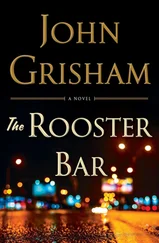She said she was sixty-four years old but this was doubted. Years of aggressive surgery had smoothed out some wrinkles, curved her chin, and brightened her eyes, but he suspected she was at least seventy. His harem, as he called it but only to himself, consisted of several women ranging in age from forty-one all the way up to Helen. To qualify, they had to be either rich or affluent, and happily single. He was not in the market for a wife, and over the years had discarded several who got complicated.
Melba brought his drink and left him in silence. Dinner was at seven thirty and there was no possible way they would arrive on time. For a judge who demanded punctuality in most matters, waiting for Helen demanded patience. So he waited, soaking up the fine worn-leather furniture, the Persian rugs, the paneled walls, the oak shelves laden with ancient books, the magnificent chandelier from another century. The house covered 10,000 square feet on four levels, and very little of it was used by Helen and Melba.
He closed his eyes and recited the latest poem. Its author had now linked him to Danny Cleveland, the former reporter for the Ledger. Disposed of in 2009, only five years ago. And before that, Eileen Nickleberry in 1998. And after, Perry Kronke in 2012, then Verno and Dunwoody less than a year ago. He felt like his victims were now crawling out of their graves and lining up, zombie-like, to come after him. He was living in a state of stunned disbelief, his thoughts a mush of rampant flashes, his debates raging over strategies that changed by the hour.
He closed his eyes and breathed deeply, then reached into a pocket, retrieved a loose capsule of Xanax, and chased it down with the ginger ale. He was taking too many of the pills. They were supposed to flatten his anxieties and relax him, but they weren’t working anymore.
Could it be possible that he was about to lose such a lofty and privileged place in life? Was he about to be exposed in some unimaginable way? The past that he had so brilliantly worked to conceal was now catching up with him. The present and all its status was at risk. The future was too horrible to dwell on.
“Hello dahling,” she said as she entered the room. Bannick jumped to his feet, threw out his hands for a polite hug, and offered sexless air kisses while saying, “You look marvelous, Helen.”
“Thank you, dear,” she said, looking down at her red sleeveless dress. “You like it? Chanel.”
“Beautiful, stunning.”
“Thank you, dahling.” She was from a small town in Georgia and fancied herself a real Southern belle. The “darling” came out dahling.
She leaned in closer, frowned, and said, “You do look tired, Judge. Dark circles around the eyes. Are you battling insomnia again?”
He had never been bothered with insomnia, but said, “I guess. A busy trial calendar.” He was too polite to say, “Well, Helen, in that case, I notice an extra roll around the old waistline. Not looking as svelte as you think.”
The good thing about Helen, and something he admired greatly, was that she never stopped trying. Always dieting, sweating, shopping for the latest fashions, studying the next surgical alternatives, buying the most expensive makeup and applying it with gusto. She claimed to be waiting for the perfect female Viagra so she could hop in the sack like a teenager. Both had laughed at this because sex was a topic they avoided.
She worked so hard at looking good that he could never say anything that might deflate her considerable ego. He looked at her feet, never a dull place, and smiled at her leopard skins. “Love your hooker’s heels,” he said with a laugh. “Jimmy Choo?”
“Always, dahling.”
They said goodbye to Melba and left the house. As usual, they would take her Mercedes because, being a complete snob, Helen would be humiliated to be seen arriving at the country club in a Ford. Bannick opened the passenger door for her and got behind the wheel. It was already seven forty and the club was fifteen minutes away. They chatted about his busy week, her grandkids in Orlando — a rotten lot with problems that only serious money could create — and after about ten minutes in traffic she said, “You seem preoccupied, Judge. What’s the matter?”
“Nothing at all. Just looking forward to a fabulous dinner of rubber chicken and cold peas.”
“It’s not that bad, really. But we can’t seem to keep a chef.”
Both were members and knew the truth. Each new head chef cooked for about six months before being fired. Each found it impossible to meet the exacting wishes of a high-end crowd that had convinced themselves they knew great food and wine.
The Escambia Country Club was a hundred years old and had five hundred members, with another one hundred prospects on the waiting list. It was “the” country club in the Pensacola area and the place where every affluent family wanted to belong. The climbers too. It sat on a bay with water on three sides of the grand hall. Manicured fairways snaked away in several directions. The whole place, from the winding shaded drive to the two hundred acres of perfect greenery, reeked of old money and exclusivity.
The entrance was under a sweeping portico where the members arrived in German cars and were greeted by doormen in black tie. Only a red carpet was missing for the lucky ones. Helen loved saying, “Well good evening, Herbert,” as he opened the door, took her hand, and got her out of the car, just as he had been doing for years. Once shed of old Herbert, she took the elbow of Judge Bannick and swept into the magnificent foyer where waiters circulated with trays of champagne. Helen practically assaulted one to get a drink, and not her first of the day. The judge took a glass of sparkling water. He was in for a long night and an even longer Sunday.
They were soon lost in a throng of well-heeled socialites, the men in the required suits and ties, the ladies in all manner of designer getup. The older ones favored clinging fabrics, dangerously plunging necklines, and no sleeves, as if determined to exhibit as much aging flesh as possible to prove they still could turn it on. The younger ladies, a small minority, seemed content with their figures and felt no need to flaunt things. Everyone talked and laughed at once as the crowd slowly inched along a wide hallway with thick carpets and large portraits on the walls. Inside the main banquet room, they weaved their way through large, round tables and eventually found their seating assignments. There was no speaker for the evening, no dais, no prime tables for sponsors. At the far end a band tuned up behind a dance floor.
The judge and Helen settled in with eight people they knew well, four other couples all properly married, but no one really cared about the arrangements. A doctor, an architect, a gravel entrepreneur, and their wives. And one man, the oldest at the table, who had dinner at the club every night with his wife and was reported to have inherited more money than all the others combined. The wine flowed and the conversations roared.
Judge Bannick flipped his switch, and flipped it again, and made himself laugh and smile and talk loudly about little that mattered. At times, though, he felt the weight of the future, the uncertainty of Monday’s mail, the fear of being stripped naked and exposed, and he lapsed into moments of pensiveness. It was impossible not to look around the room at the friends and leaders and people he had always known and admired without asking: What will they say?
He, decked in Zegna and rubbing elbows with the rich, was a most respected judge, admired by important people, and he was also, at least in his opinion, the most brilliant killer in American history. He had studied the others. Thugs, all. Some downright ignorant.
He told himself to shake it off, and took a question about an oil spill in the Gulf. Some of the crude was inching toward Pensacola and the alarms were up. Yes, he surmised that there would be a great deal of litigation in the near future. You know the plaintiffs bar, he said, they’ll sue the moment the oil slick is in sight, and probably before. The spill was front page and for a while the entire table quizzed His Honor on who might be able to sue whom. It passed; the women lost interest and pursued their own little chats as dinner was served.
Читать дальше












